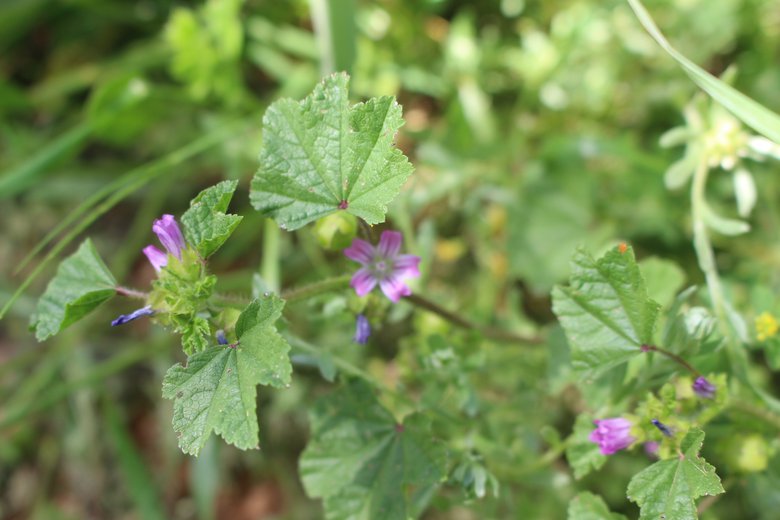
Runyankore Rukiga: EKITUGUMA, Luganda: MBUWUGULA, OMULENDE, Kiswahiri: GGALA GGALI, Teso: EKIRURUNI, Botanical Name: MALVA PARVIFLORA
Mallow is a common weed of crops, pastures, orchards, roadsides, gardens, and disturbed sites. It can flower and set seed quickly, which means weed populations can increase quickly. Mallow has a long tap root, enabling it to survive under harsh conditions. This also means that control measures are most effective when the plants are small. Mallow is also resistant to glyphosate. It thrives in disturbed areas and loves the extra nitrogen many farms apply.
Malva parviflora, commonly known as little mallow or cheeseweed, has a variety of traditional medicinal uses. It is often used to treat coughs, colds, and fevers, with decoctions of the whole plant serving as a remedy. It is also used for its emollient and anti-inflammatory properties, applied as poultices or infusions to manage wounds, swellings, and inflammation. Additionally, it is believed to have diuretic, laxative, and anthelmintic effects, as well as being used for hair loss and scorpion stings.
Traditional uses:
Common Uses: Cough, cold, and fever: Decoctions of the whole plant are used as a remedy for these ailments. Wounds, swellings, and inflammation: Poultices or infusions made from the leaves are used to treat these conditions, leveraging the plant’s emollient and anti-inflammatory properties.
Digestive issues: Used as a laxative and for treating constipation, diarrhea, and abdominal pain.
Other uses: Used for hair loss, scorpion stings, bladder ulcers, and even as a diuretic and anthelmintic.
Nervine tonic: Leaf tea is used as a nervine tonic and to treat profuse menstruation.
Specific Uses and Preparations:
Poultice: Used for boils, inflamed, purulent wounds, and swellings.
Infusion or tea: Used for coughs, bronchitis, and dry, irritative coughs.
Decoction: Used as a hair rinse to remove dandruff and soften hair.
Dried powder or infusion of leaves and roots: Used to clean wounds and sores.
Seeds: Used as a demulcent for coughs and bladder ulcers.
Research and Potential Benefits:
Antioxidant and anti-inflammatory properties: M. parviflora has shown high antioxidant potential and anti-inflammatory effects.
Antimicrobial and antifungal properties: Extracts from the plant have shown antimicrobial and antifungal activity, though often weaker than standard antibiotics.
Other potential benefits: Research suggests potential for anti-diabetic, hepatoprotective, neuroprotective, analgesic, and wound healing effects
Would you like more information on Malva parviflora uses?
Contact: Proficient Muteguya Goodrich, From Alleluia Reflexology Healing Centre
Makerere Kampala, a long Sir Apollo Kaggwa Road,
Bifro House Near dfcu Bank, opposite Stabex Petrol station ⛽ at MBI stage,
YouTube: Proficient Muteguya Goodrich
Telephone ☎:0772969461, 0703003733
Email address: alleluia.drink@gmail.com




Comments (2)
Christmas Aron no.564
says September 12, 2025 at 2:34 pmThank you very much
linedevelopers@gmail.com
says October 01, 2025 at 10:35 amYou are welcome